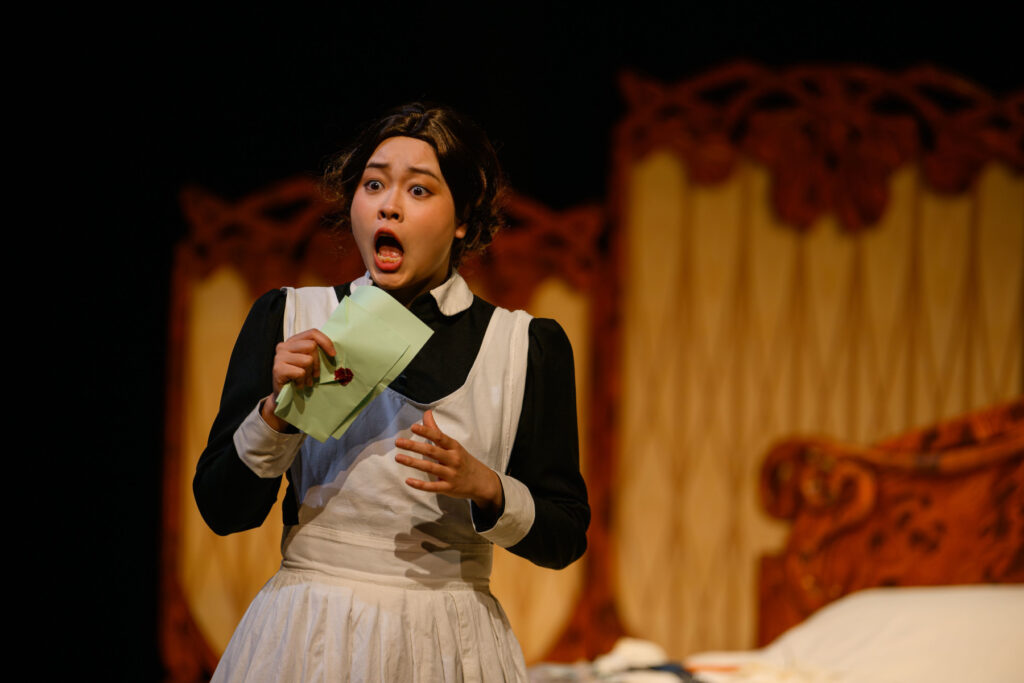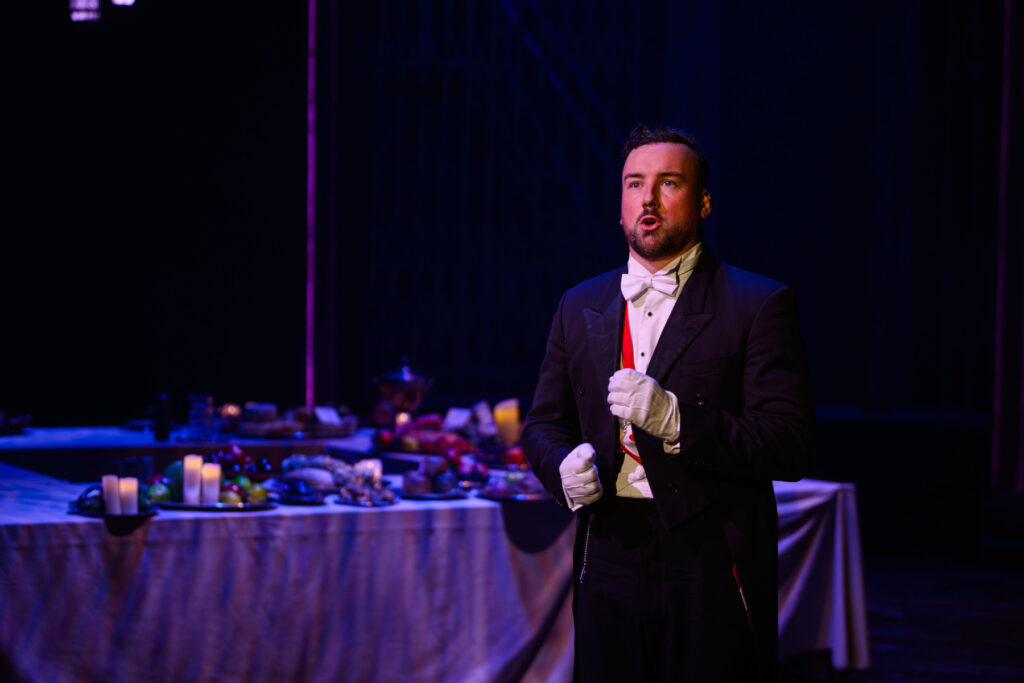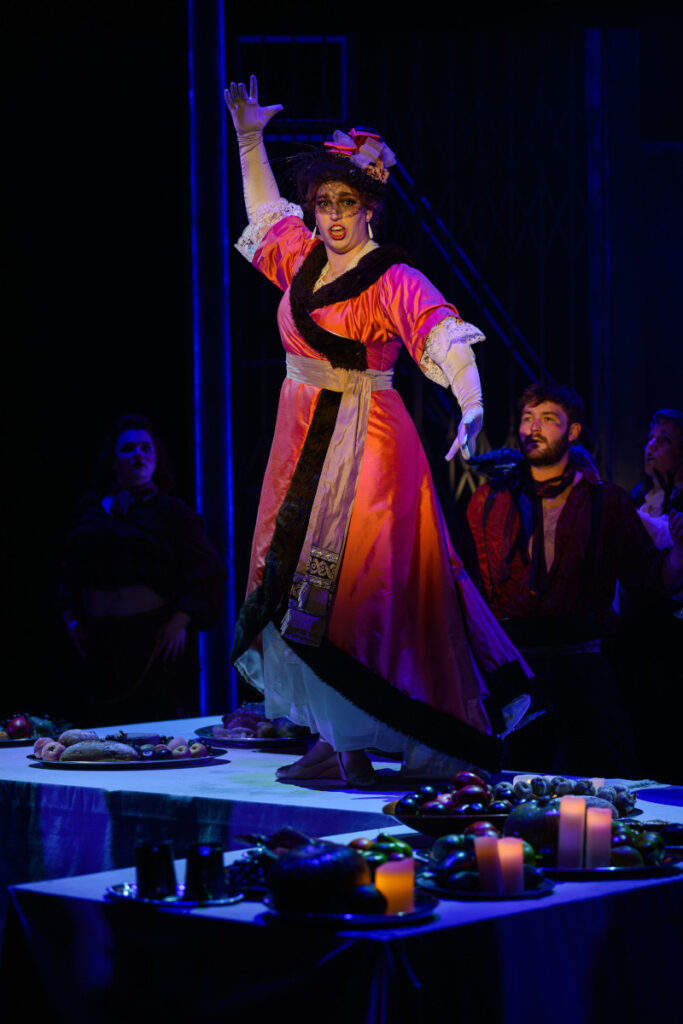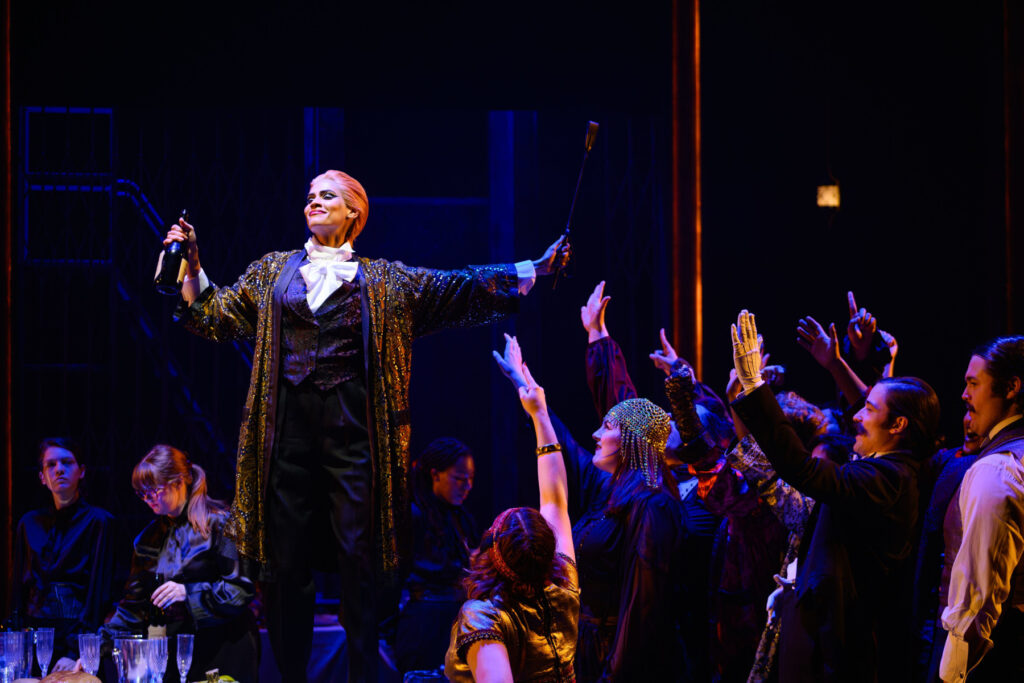Beware the dangers of playing pranks on friends who might nurse their grudges until the right moment presents itself to seek redress. Revenge is after all a dish best served cold. The unsuspecting Gabriel von Eisenstein, a Viennese man-about-town, has long forgotten the humiliation he caused his friend Dr Falke by leaving him to wander home in a drunken stupor wearing the costume that ends up becoming his nickname, The Bat. Dr Falke’s determination to exact retribution is the stuff of Johann Strauss’s operetta Die Fledermaus, one of sixteen such works which he composed between 1871 and 1897, securing his place as a master of light entertainment, becoming in turn the forerunner of modern musicals.

Right at the start of the Guildhall School’s new production of this fizzy froth of fun, there is an ingenious link to one of the most successful musicals of the modern age, Cabaret. Before the overture concludes, Dr Falke himself bounds down the stairs of the auditorium and in true conférencier mode greets the audience with those memorable words, “Willkommen, Guten Abend, meine Damen und Herren”. A sideways glance at Offenbach, one of the greatest purveyors of light opera, sees the members of the chorus dancing the can-can under a slightly raised curtain before receiving tickets to the grand party Dr Falke has organised.
Die Fledermaus dates from 1874, at the start of la belle époque which extended to the outbreak of war in 1914, and the first act is dominated by a beautifully designed, pure Art Nouveau set, seven large paravents covering the back of the stage, with a centrally placed king-size bed. We are in the Eisensteins’ bedroom, a shift in traditional staging which lends a greater degree of intimacy to proceedings. This raised my expectations that designer Adam Wiltshire would give us something of the hedonistic lifestyle so typical of the period by emphasising the opulence of Prince Orlofsky’s ballroom in the second act. Instead, there is an array of suspended lanterns in a garden setting, with four large tables bedecked with fine fare. This is one aspect of Ashley Dean’s direction which doesn’t quite work. The tables are constantly moved backwards and forwards, to and fro, in renewed configurations, the platters of food lifted on high only to be deposited elsewhere. I derived much pleasure from the sheer physicality of this production: having such exclusively young performers on stage means there are agile, lithe and supple bodies on display throughout, but there is simply too much fuss, busyness and indeed occasional breathlessness. I would also question the appropriateness of the costumes for the members of the chorus, who double up as dancers in quite complicated and not always ideally coordinated choreography. They look as though most of them have arrived on Arabian magic carpets from elsewhere, baring a lot of naked flesh. In terms of period authenticity, we are moved in a jolt to styling from the 1920s, with cloche hats and a lot of gold lamé, Art Deco already approaching from the distance. One of the rules of good stage direction is that the eye must never be torn between two centres of activity. For Orlofsky’s main aria, “Ich lade gern mir Gäste ein“, too much is going on simultaneously with the arrival of Dr Falke and his contortions on the other side of the stage.

In contrast, the final act brings a welcome reduction in hyperactivity. There is a vintage secretaire desk with a suspiciously modern-looking executive chair on castors, which like the trestle tables in the previous act is moved endlessly around, but apart from stairs leading down to the cells and a skylight above, the stage is suitably bare. Entrances and exits are therefore much more dramatic.
Musically, there is a lot going for this production. In the pit Dominic Wheeler serves up an appetising and deliciously spiked traversal of the score, ideally paced and always atmospheric. I noted several significant details: the perky side-drum, mournful oboe and aching lower strings in the overture, as well as a characterful bassoon solo in the final act when the prison governor Frank is busy signing documents. Above all, Wheeler understands the importance of Viennese lilt, with those tiny agogic hesitations and sudden accelerandos that provide much of the effervescent spirit contained in the music.

There were no real weaknesses in the casting. Eisenstein’s role is tricky, for it encompasses elements of both baritone and tenor. Dominic Lee brought considerable warmth and authority to the part, displaying his fine lyrical qualities especially in his Act 2 duet with Rosalinde, “Dieser Anstand, so manierlich”, during which she successfully appropriates his repeating watch, the talisman or little “mouse trap” that he has employed so often before in seductive situations. In her early appearances Mrs Eisenstein might be thought to be wearing the trousers in that particular household: in this role Mariana Fernandes projected her powerful soprano voice well, with an initially slightly uncomfortable spread. However, in her alter ego as the Hungarian countess at Orlofsky’s party, her admirably inflected csárdás, “Klänge der Heimat”, revealed a multi-faceted quality of characterisation.
It was easy to fall under the sway of the flirtatious Biquing Zhang as the humble housemaid Adele. Her deliberately exaggerated wailing used as a stratagem for gaining a night off was as effective as her squeals of delight elsewhere and the demonstration of her acting talents, both in the Act 2 aria, “Mein Herr Marquis” and in the final act. Fresh-toned and focused, she delivered all the coloratura elements with aplomb. Orlofsky is a trouser role, and here Karima El Demerdasch’s warm mezzo had an alluring presence, even if she could have made rather more of her inherently melancholic mood and desire for frolicsome fun. This is where Die Fledermaus highlights an important degree of social commentary: vast personal riches do not automatically lead to happiness.

Hector Bloggs’s rich and rounded baritone made the mischief-maker Dr Falke a focal figure. Ultimately, he gains his revenge on the hapless Eisenstein, but both admit the whole concoction was merely a jest and all the fault of the vast quantities of champagne imbibed at Orlofsky’s party. As Alfred, the lover rejected by Rosalinde in favour of Eisenstein, Sang Eup Son forced his tone a little in his key Act 1 aria, “Trinke, Liebchen, trinke schnell”, but he gave a good account of himself in the mode of a passionate Venetian gondoliere. Thomas McGowan was a suitably officious prison governor, Sonny Fielding the bumbling and eponymous lawyer Dr Blind, Manon Ogwen Parry an infectious sister Ida to Adele, and Redmond Sanders rounded things off in the speaking role of the jailer Frosch.
Slight niggles aside – the surtitles need rather more care (“my vehicle awaits” is far too modern; “she’s fobbed my watch” doesn’t quite hit the mark) – this sparkling production delivers not only an evening of high-class fun with its tale of mistaken identities and illicit liaisons, but is also testament to the quality of the combined Guildhall forces. It would not disgrace many a more luminous theatrical stage elsewhere.
Alexander Hall
Die Fledermaus
Operetta in three acts to a libretto by Carl Haffner and Richard Genée based on the play Le Réveillon by Henri Meilhac and Ludovic Halévy
Music by Johann Strauss II
Sung in German with English surtitles created by Ruth Hansford
Cast and production staff:
Gabriel von Eisenstein – Dominic Lee; Rosalinde – Mariana Fernandes; Adele – Biqing Zhang; Ida – Manon Ogwen Parry; Alfred – Sang Eup Son; Dr Falke – Hector Bloggs; Dr Blind – Sonny Fielding; Frank – Thomas McGowan; Prince Orlofsky – Karima El Demerdasch; Frosch (speaking role) – Redmond Sanders
Director – Ashley Dean; Assistant Director – Eleanor Strutt; Designer – Adam Wiltshire; Lighting Designer – Johanna Town; Choreography & Movement Director – Angelo Smimmo; Intimacy Director – Abigail Kessel; Orchestra and Chorus of Guildhall School of Music & Drama; Assistant Conductor & Chorus Master – Henry Reavey; Conductor – Dominic Wheeler
Silk Street Theatre, London, 4 November 2024
Further performances until 11 November
Top image: The Eisensteins in their bedroom with housemaid Adele
All photos © David Monteith-Hodge